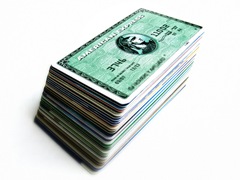As readers of this blog know, I consider the smoke-to-fire ratio on ID theft to be heavily skewed to smoke. ID theft does occasionally cost consumers real  money and cause real headaches, but those occasions are orders of magnitude rarer than popular wisdom would lead you to believe.
money and cause real headaches, but those occasions are orders of magnitude rarer than popular wisdom would lead you to believe.
The basic truth about ID theft is that it is a form of fraud in which the consumer almost always plays the role innocent bystander rather than victim. Sure, sometimes innocent bystanders get hurt, but the basic idea of ID theft is to trick a financial institution into handing over some cash. Why steal from a consumer when you can steal from a bank? As a great philosopher once said “that’s where the money is.”
One of the reasons that this basic truth is routinely obscured is that perpetuating the Great ID Theft Scare is just so convenient for so many people. The snake oil salesmen at LifeLock and it’s competitors are leading examples, but there are others. Journalists in search of an easy story to write are another.
Read more »
As April 15 approaches, some of us experience a short-lived obsession with, and resentment of, taxes. For fairly obvious reasons, those of us who put off  sending in the old 1040 until the last minute tend to be those who need to accompany our returns with checks made out to the Treasury. Folks entitled to checks going the other way tended to file weeks ago.
sending in the old 1040 until the last minute tend to be those who need to accompany our returns with checks made out to the Treasury. Folks entitled to checks going the other way tended to file weeks ago.
Having to fill out lengthy government forms is bad enough. Capping off the process with a savingsectomy is enough to turn anybody into a grumpy Republican. For me, this is like being an Irishman on St. Patrick’s Day. I enjoy the company of my temporary compatriots, even though I know it won’t last long.
Pandering to this grumbling constituency this week was The Big Money, which shared a list of the five worst parts of the tax code. The fact that they could come up with only five tells me they are only seasonally grumpy. A year-round resident would have come up with at least ten.
Read more »
This past weekend the Wall Street Journal carried a somewhat confused article on what we hip investor types call cash. Just to be clear, what we refer to is not literally cash, not slips of paper with pictures of dead politicians, but rather highly liquid assets we can use to buy stuff. Like a checking account.
 I say the article is confused (and confusing, for that matter) because although it starts with important reminders about how chasing slightly higher yields on cash caused many investors great pain in the fall of ‘08, and then repeats the equally important principle that “the only way to boost yield is to take more risk” it promptly explains how to boost yield by taking more risk with your cash.
I say the article is confused (and confusing, for that matter) because although it starts with important reminders about how chasing slightly higher yields on cash caused many investors great pain in the fall of ‘08, and then repeats the equally important principle that “the only way to boost yield is to take more risk” it promptly explains how to boost yield by taking more risk with your cash.
Generally speaking, the interest rate you get paid on cash deposits, in money market funds, short term Treasuries, and the like, is very low. It usually approximates the inflation rate, meaning that with a little luck the real value of your cash treads water.
Read more »
Continuing in the spirit of the tax season, this week saw at least two blogs, Weakonomics and Wallet Pop, asking if allowing taxpayers to deduct  mortgage interest is really, after all, a good idea. Both wasted little time before concluding of course not.
mortgage interest is really, after all, a good idea. Both wasted little time before concluding of course not.
In as much as this policy has any sincere defenders, the argument in favor is that it encourages home ownership. But why home ownership, of all things, is a worthwhile goal is generally left unexplored. I suppose a person might imagine some sort of Jeffersonian argument about how a nation of property owners makes for a more stable democracy. Alas, our leaders in Washington are rarely so philosophical.
When a politician says that he favors mortgage deductibility because it encourages home ownership it is a wink and/or nod in the direction of those who already own homes. It is an important bit of government largess for these voters because they get a nice tax break and, possibly more significantly, anybody they sell their house to will also get a nice tax break.
Read more »
I like Wallet Pop. Just thought I’d throw that out at the start before I got into today’s topic.
 The other week Wallet Pop ran one of those lists-with-stock-photos features that are popular on sites with a lot more production value than this one. The subject was 10 Bad Habits and What They Cost You. It is a list of minor vices and what they will set you back over the course of the year. The feature does not actually say that if you didn’t do these things you’d be rich, but we know that’s what they mean.
The other week Wallet Pop ran one of those lists-with-stock-photos features that are popular on sites with a lot more production value than this one. The subject was 10 Bad Habits and What They Cost You. It is a list of minor vices and what they will set you back over the course of the year. The feature does not actually say that if you didn’t do these things you’d be rich, but we know that’s what they mean.
This is, of course, the latte thing again. The idea is that your budget is leaking cash on a daily basis to pay for little luxuries and conveniences. Plug those holes and all will be well. And Wallet Pop gets a total annual cost for its collection of indulgences of $12,289, which is real money for many people. The difference between saving and spending that amount over many years could translate into a significant difference in retirement lifestyle.
Read more »
 money and cause real headaches, but those occasions are orders of magnitude rarer than popular wisdom would lead you to believe.
money and cause real headaches, but those occasions are orders of magnitude rarer than popular wisdom would lead you to believe.


